
Mike Johnston on Facebook

Audio By Carbonatix
Denver is an easy city to make fun of, but we’ll defend it until we’re dead and buried. The people here can be awkward, friendly, rude, aloof, selfish, well-meaning or just really, really high on anything from legal weed to legal mushrooms to legal ketamine. As in any big city, there are assholes and loudmouths, heroes and victims, and an abundance of people too busy to notice that the joke is on them.
Mix it all together, and we have a Mile High stew full of good news, bad news and hilariously weird news. From driving a Chrysler through 16th Street Mall construction to a lawsuit against the smell coming from an infamous pet food plant, here are Westword‘s most Denver stories of 2024:
Denver City Council Has Questions About Mike Johnston’s Yellow Vest Ambassadors
If someone were asked to conjure up a satirical version of the average Denver person, they might think of a moderately fit passive-aggressive white person wearing a Patagonia vest. Mayor Johnston’s new crew of downtown ambassadors could only get Cotopaxi, but close enough.
Part of Johnston’s Clean and Safe Downtown Initiative, Denver’s Yellow Vest Ambassadors were announced in January. They range from city employees to members of the Downtown Denver Partnership, property managers, business owners, representatives of registered neighborhood organizations, and nonprofit workers who help those experiencing homelessness, addiction or abuse.
The ambassadors are intended to be friendly faces for residents and walking directories for visitors. Along with mustard-colored vests, they’re equipped with a QR code that provides information about activities and events downtown. Because who wouldn’t want to hang out on the 16th Street Mall while it’s still under construction?
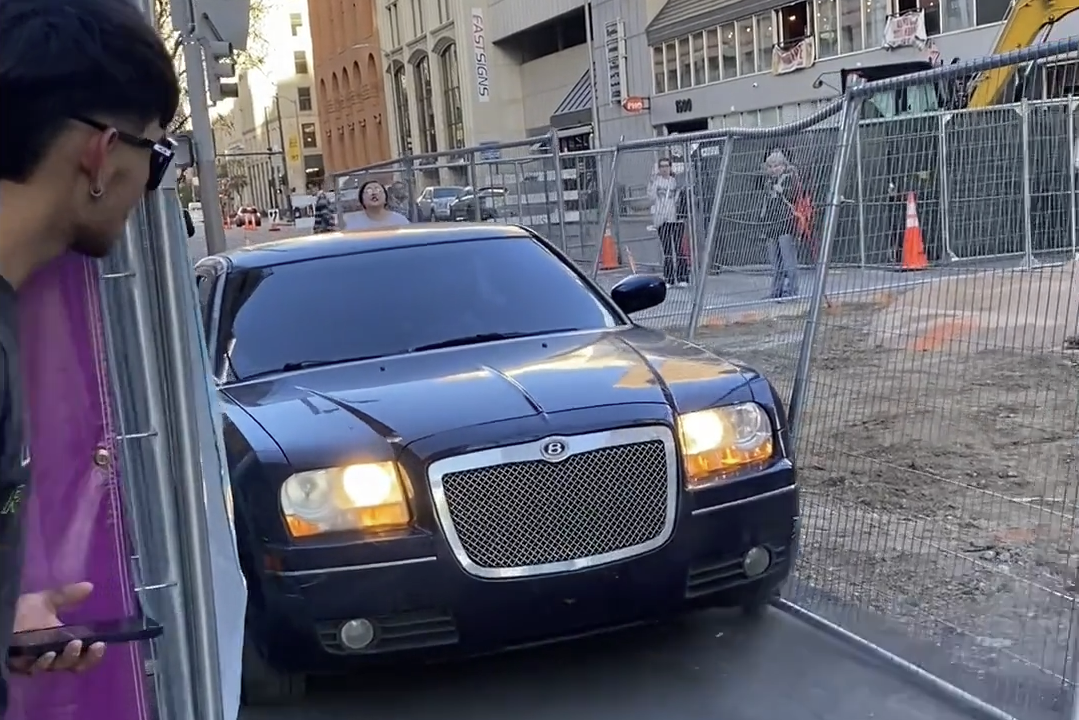
The accused driver in this viral incident on 16th Street Mall failed to appear in court on Tuesday, February 27.
Devon Wittstruck
Woman Accused of Plowing a Chrysler Through the 16th Street Mall Skips Court
Just about everyone in Denver is sick and tired of the 16th Street Mall construction and surrounding congestion, but the driver of a Chrysler 300 took that to a whole ‘nother level this past year in a now-viral incident that still pops up on Reddit from time to time. In the video, a woman drives the 300 through a fenced-in sidewalk near the intersection of 16th and Champa streets, seemingly trying to squeeze around a road closure. The chain-link fences scrape the sides of the car and blow out multiple tires.
At one point, a passenger gets out of the car to try to help navigate, yelling at bystanders who are recording videos as the driver gets stuck between the construction fence and the patio seating area of Modern Market. Eventually, the driver forces the car through the narrow walkway and continues driving on the sidewalk before turning onto Champa, driving toward 15th Street and then crashing into another vehicle parked outside of the now-closed Cheba Hut.
The driver, Unique Martinez of Englewood, was due in court for a hearing in February, but she never showed up, according to the Denver District Attorney’s Office. After being taken into custody in June, Martinez eventually pleaded guilty to Reckless Driving Involving a Vulnerable Road User and was sentenced to 100 hours of useful public service, a Driving Safety level 2 class, and an Alive@25 driving education class.

The Colorado Rockies took on the Tampa Bay Rays for Opening Day at Coors Field this year.
Chris Perez
“A Party’s a Party”: Rockies Fans Bring Good Vibes to Coors Field for Opening Day Walk-Off
The Colorado Rockies rank in the top half of stadium attendance despite routinely being in the bottom five in wins as the season ends. Most fans at Coors Field on April 6 for Opening Day knew the 2024 season would bring the same misery, but springtime on Blake Street is never about negativity.
Whether they could name more than a single player on the roster is one question, but the enthusiasm of Rockies fans is never in doubt on Opening Day. One couple showed off their custom purple 1957 Chevrolet Bel Air, complete with Rockies decals, a tradition they’ve been upholding for a decade, and just about everyone in a four-block radius was wearing some form of purple. But the fans weren’t there to support the front office or the team’s notoriously cheap ownership.
“What else do we have to do?” longtime fan Steve Greer asked Westword that day. “We love Rockies baseball, but we’re not here supporting the team. We’re here supporting our happiness.”
That support was rewarded on Opening Day when third baseman Ryan McMahon hit a walk-off grand slam to beat the Tampa Rays. The Rockies ended up with a 61-101 record, good for second-worst in Major League Baseball. And while fans are certainly nearing the end of their rope, there will always be a good turnout for Opening Day.

Amarilis (right) and Mariangy Delgado Gutierrez, both migrants from Venezuela, tied the knot during a small ceremony at Sloan’s Lake on June 9.
Bennito L. Kelty
Denver Residents Throw Wedding for LGBTQ Migrants From Venezuela
Colorado’s influx of migrants, most of whom are from Venezuela, has impacted the Denver area in countless ways. And despite reports of crime, government spending and gang activity at notorious Aurora apartment complexes, most of the 43,000 migrants simply want to create a better life with the people they love. That’s all Amarilis and Mariangy Delgado Gutierrez wanted when they left their home country in the summer of 2023. After being rejected by their families, traversing Colombian jungles, selling lollipops across South America, coming into America and taking a bus from Texas to Denver, they’re on the path to finding that life together.
Featured in a story about the two women selling arepas in the Denver area earlier this year, the couple caught the attention of Dork Dancing, a mental health advocacy nonprofit that also hosts dances at Sloan’s Lake Park. Susan Law, the nonprofit’s executive director, reached out to Amarilis and Mariangy and eventually befriended the women. Law later learned that they couldn’t get married because they couldn’t afford the $30 marriage license in Colorado.
“They didn’t have the $30 because they felt bad spending it when they didn’t have their children’s food,” Law told Westword. “The day I met them, I told them I would throw them a wedding.” And hold a wedding she did, with several dozen people attending the ceremony at Sloan’s Lake Park on Sunday, June 9.
“Thank God that when we got here, we started to feel a lot better,” Amarilis says of Denver. “The people here have supported us a lot. We’ve received a lot of help from a lot of people. We can get ahead and move forward little by little. We still have a long way to go, but we’re coming along little by little until we get to a stable situation.”
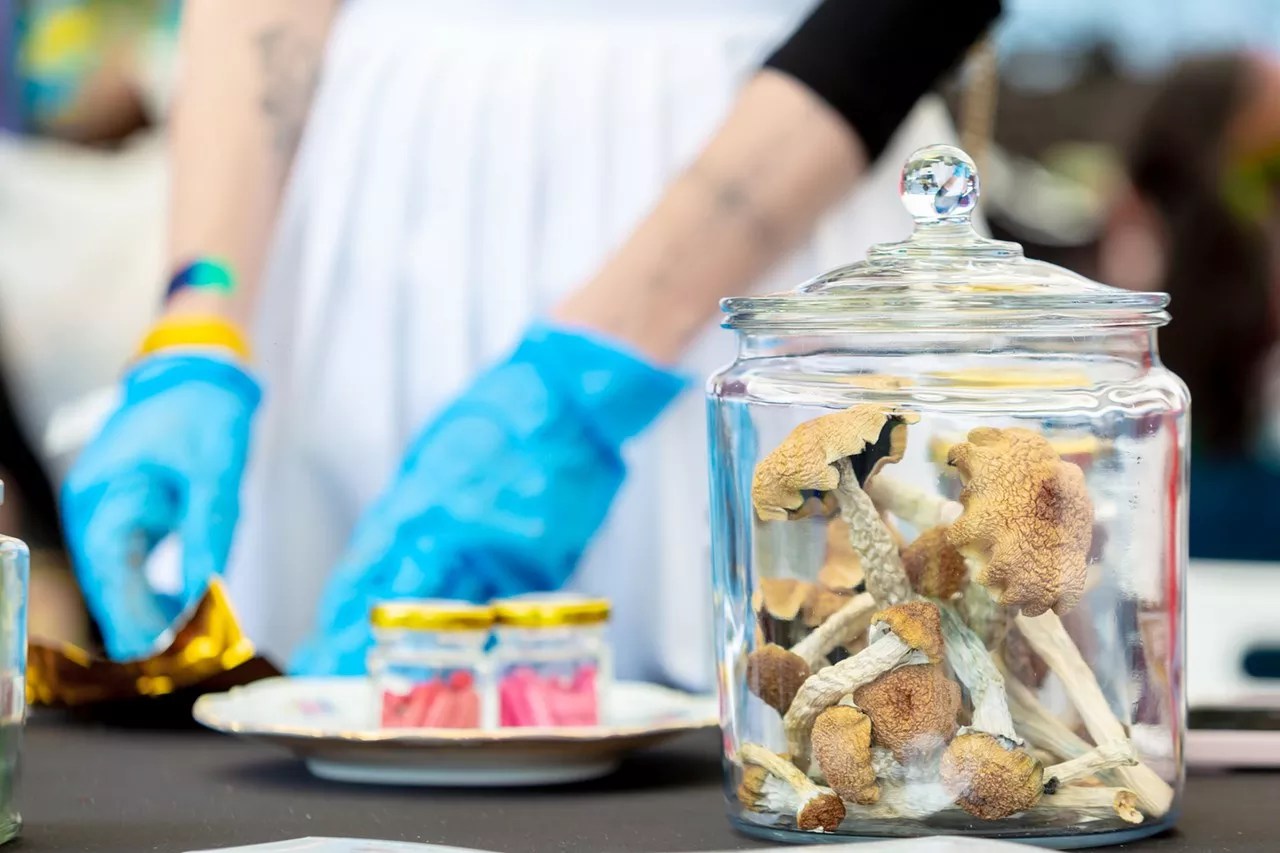
Psychedelic mushrooms are getting more attention from universities as legalization and decriminalization measures spread.
Brandon Johnson
Inside Denver’s First Magic Mushroom Festival
If America needed more of anything in 2024, it was mushrooms (although 2025 will give us plenty of opportunities). We didn’t have that problem in the Mile High, however. Colorado is one of two states with a legal therapeutic psilocybin program, and the only one allowing personal possession of mushrooms and other natural psychedelics. And as the first major city to decriminalize psilocybin possession in 2019, it’s only fitting that Denver held a pioneering, public-facing magic mushroom festival on June 9, the first of its kind in Colorado.
Thanks to statewide psychedelic decriminalization efforts, displaying and sharing (but not selling) psilocybin mushrooms is legal in Colorado. With vendors and exhibition spaces placed inside and outside at ReelWorks, Shroom Fest organizers hoped to educate and inspire mushroom enthusiasts of all kinds.

A new poll found Denver residents have strong connections to outdoor recreation, dogs, craft beer and Red Rocks.
Unsplash/Drew Farwell
New Poll Finds Denver Residents Live Up to Colorado Stereotypes
Colorado stereotypes are mostly based on the way Denver swings and are pretty easy to pinpoint: Everyone likes hiking with their dog. Or biking or skiing in the mountains. Or heading to Red Rocks for a concert, where they’ll pre-game with craft beer or a joint of legal weed. But are those stereotypes actually true?
According to a summer poll from the Colorado Polling Institute, most of the state’s stereotypes hold up in Denver, with 72 percent of over 400 voters saying they had hiked, biked, skied or recreated in the mountains in the last twelve months. Around 54 percent had consumed a craft beer within the past year, while 33 percent said they’d purchased cannabis at least once over the past year, almost double the rate of Americans who said they smoked marijuana.
Other highlights adding to the generic Colorado human: 40 percent of people said they had gone to an event at Red Rocks Amphitheatre within the last year, and 50 percent owned a dog. Meanwhile, just 20 percent of Denverites said they had a child under eighteen.
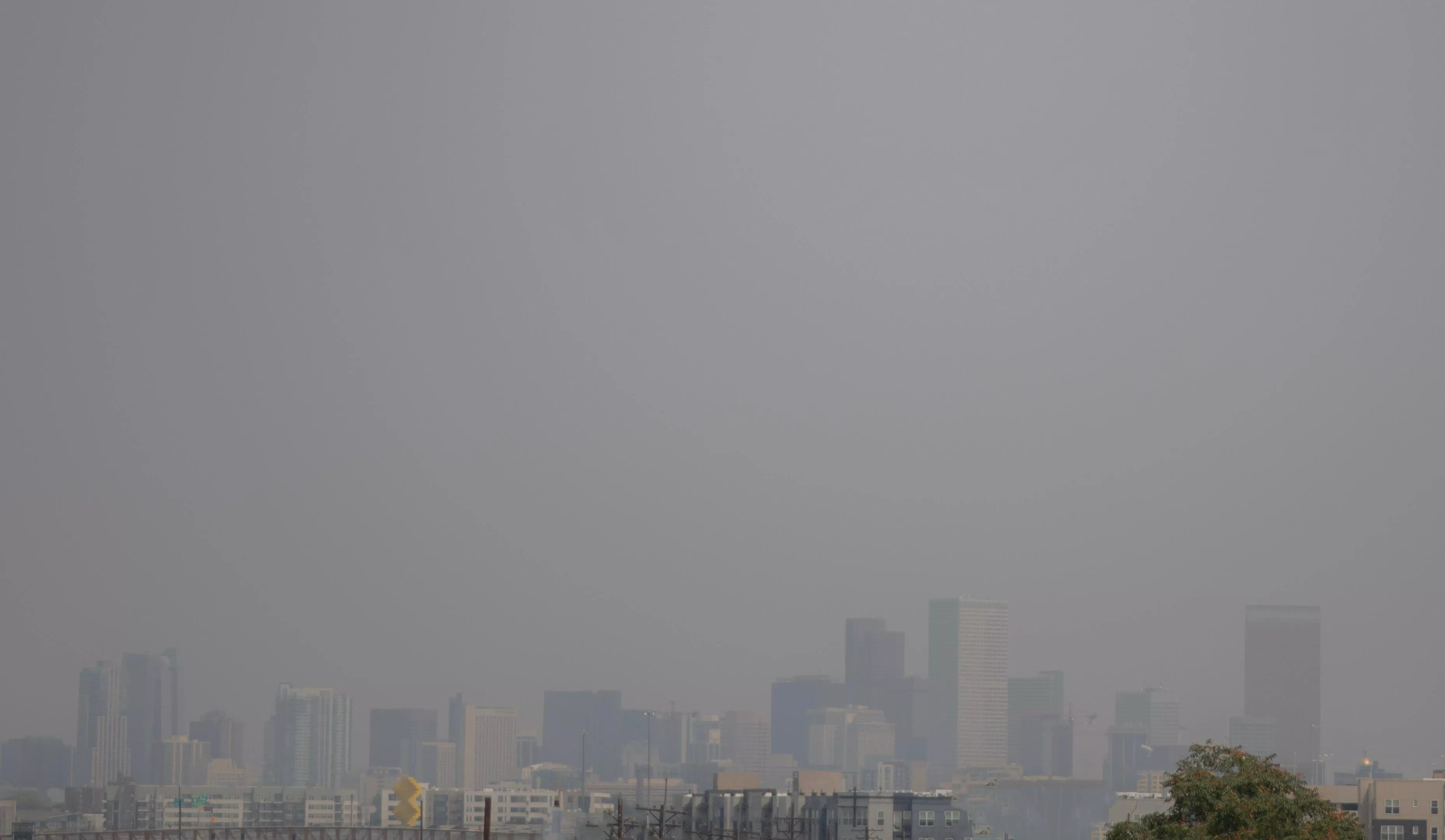
Denver has spent a few days at the bottom of international air quality rankings in 2023 and 2024 thanks to wildfires in Canada and the northern United States.
Evan Semón
Denver’s Air Quality Among the Worst in the World Right Now
Be it from wildfires in Colorado, Canada or anywhere else in our hemisphere, smoke and smog have become common in Denver summers. This high-altitude city, surrounded by mountain ranges, was never a model of air quality to begin with, but we reached a new low on July 23, when Denver’s air quality was ranked as the worst in the United States and the eighth-worst in the world. As the footprint of wildfires increases across the western half of North America, hazy skies will likely become a normal occurrence in Denver summers, dimming out mountaintops and skyscrapers as our throats itch just a little more.
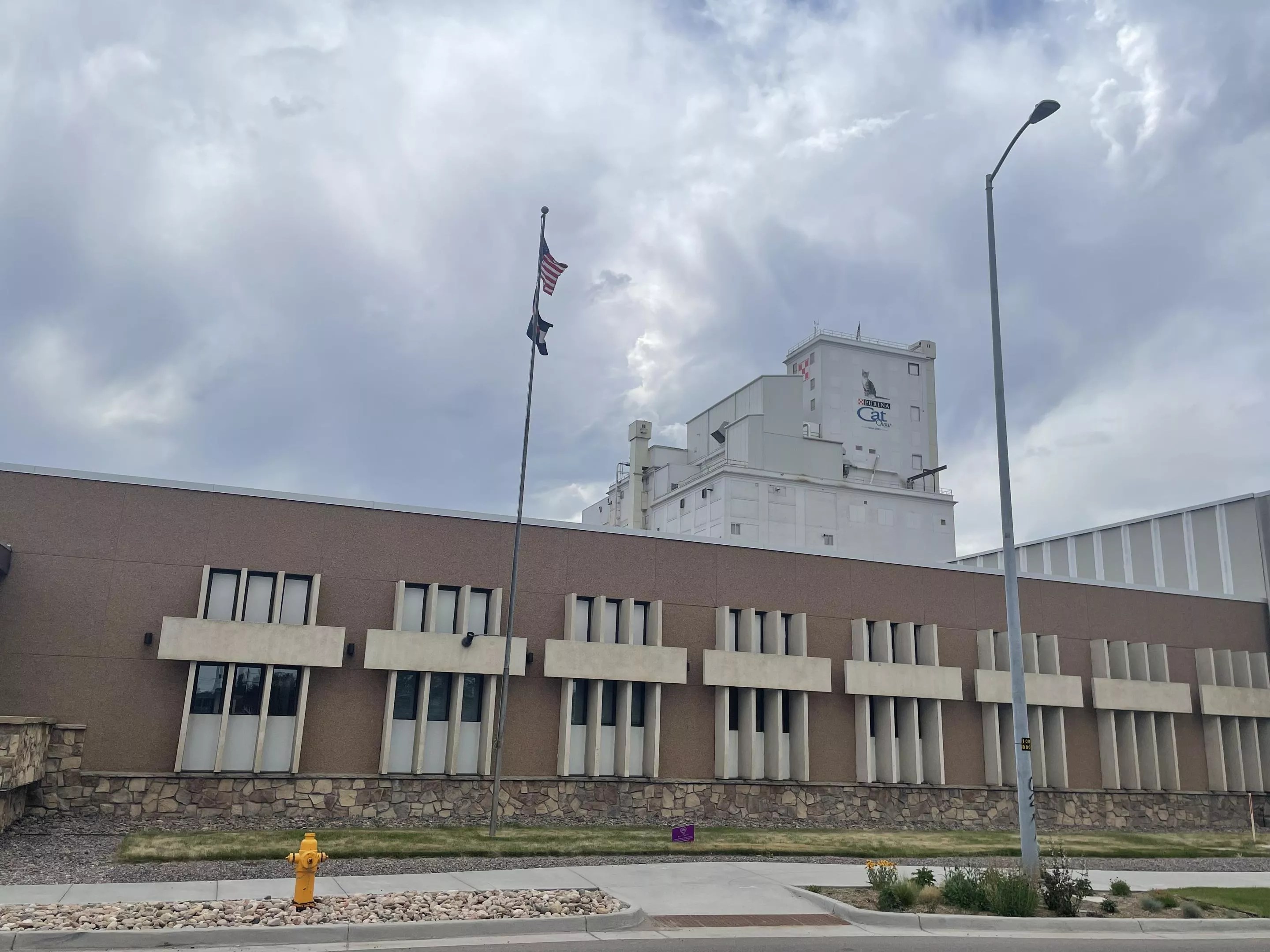
The Purina pet food factory in north Denver has been sued for offending nearby nostrils.
Catie Cheshire
Purina Plant Cited by Colorado Health Department Again for Smelling Bad
Every city has a notorious factory of stink like the Purina pet food factory in north Denver. A business so smelly yet entrenched in the economy that waking up one day without that daily odor, a dream universally shared by everyone living from Commerce City to south Denver, seems weirder than living with it. So imagine our surprise (and olfactory joy) upon finding out that some people are actually doing something about it.
In May, residents near the Purina factory filed a class-action lawsuit in U.S. District Court alleging noxious fumes from the pet food plant are so bad that people who live nearby should be compensated for their loss of property value and quality of life. Westword reporting in September discovered that state and local health officials have cited the factory three different times for the stench over the past three years, with a $12,000 fine from the City of Denver in 2021 and a $7,000 penalty from the state Department of Public Health and Environment earlier this year. Purina has agreed to comply with regulations regarding odor emissions and an Odor Control Plan from Denver’s local health department, according to a CDPHE enforcement package, but we will be holding our breath.
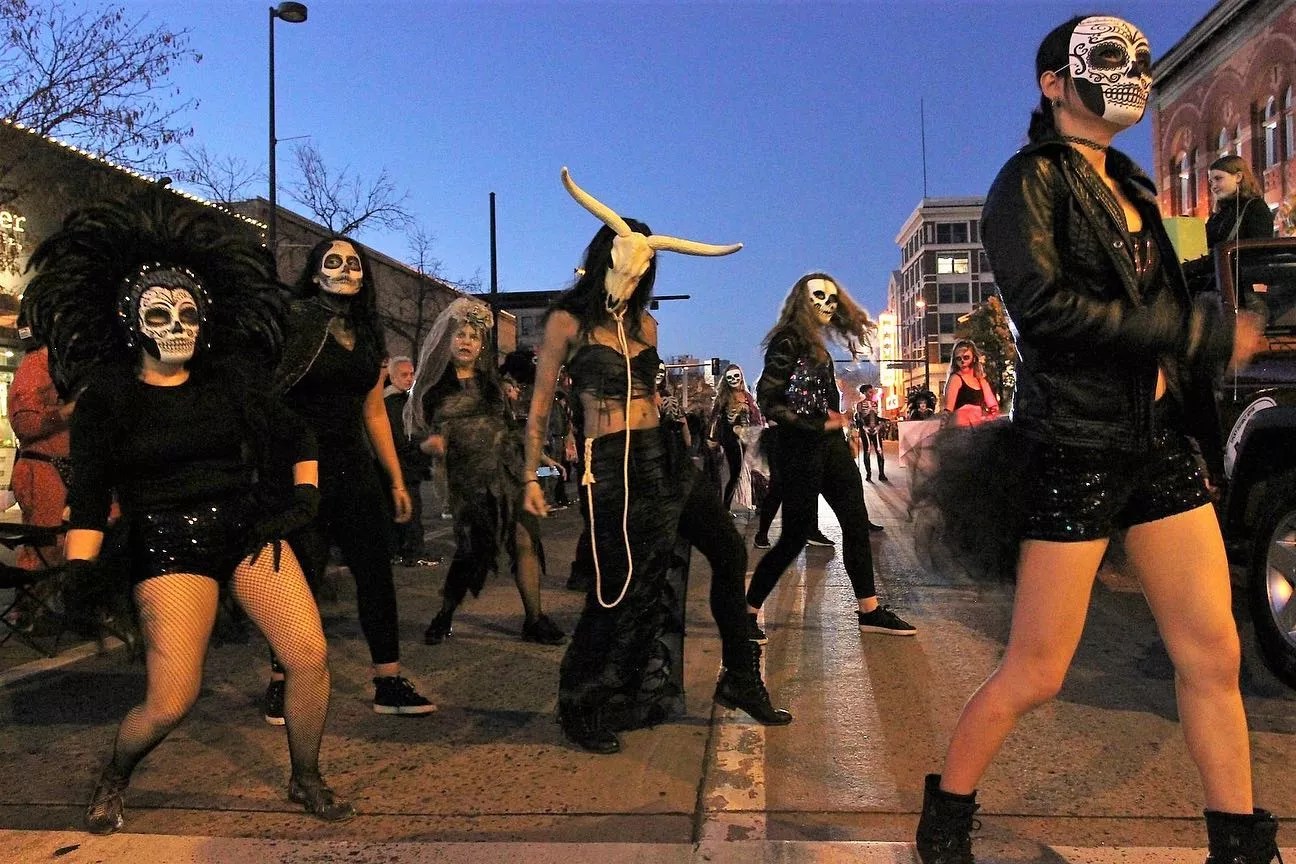
The Broadway Halloween Parade now attracts over 30,000 attendees.
Courtesy of Broadway Halloween Parade
Broadway Halloween Parade Saved by Last-Minute Sponsors, Community Donations
Whether it’s banding together to save a longtime local business or buying a bullied child a new skateboard, Denver residents have proven time and again that they’re capable of opening their hearts and wallets in amazing ways. One of the best examples of that in 2024 was saving the annual Broadway Halloween Parade from a temporary death.
With over 30,000 people now attending the metro area’s largest Halloween parade, organizers met with the Denver Police Department for a safer execution plan, but that included a $26,000 bill for pedestrian barricades and crowd control. Accustomed to running on a $13,000 budget, the Broadway Merchants Association was facing the possibility of canceling the 2024 parade unless $40,000 was raised to pay for a safety plan and other necessary permits and operating costs, according to BMA president Luke Johnson.
With just over a month before the parade date on October 19, the BMA announced that individual community members and several local businesses had donated tens of thousands of dollars to keep the parade out of the graveyard and on Broadway, where it belongs.
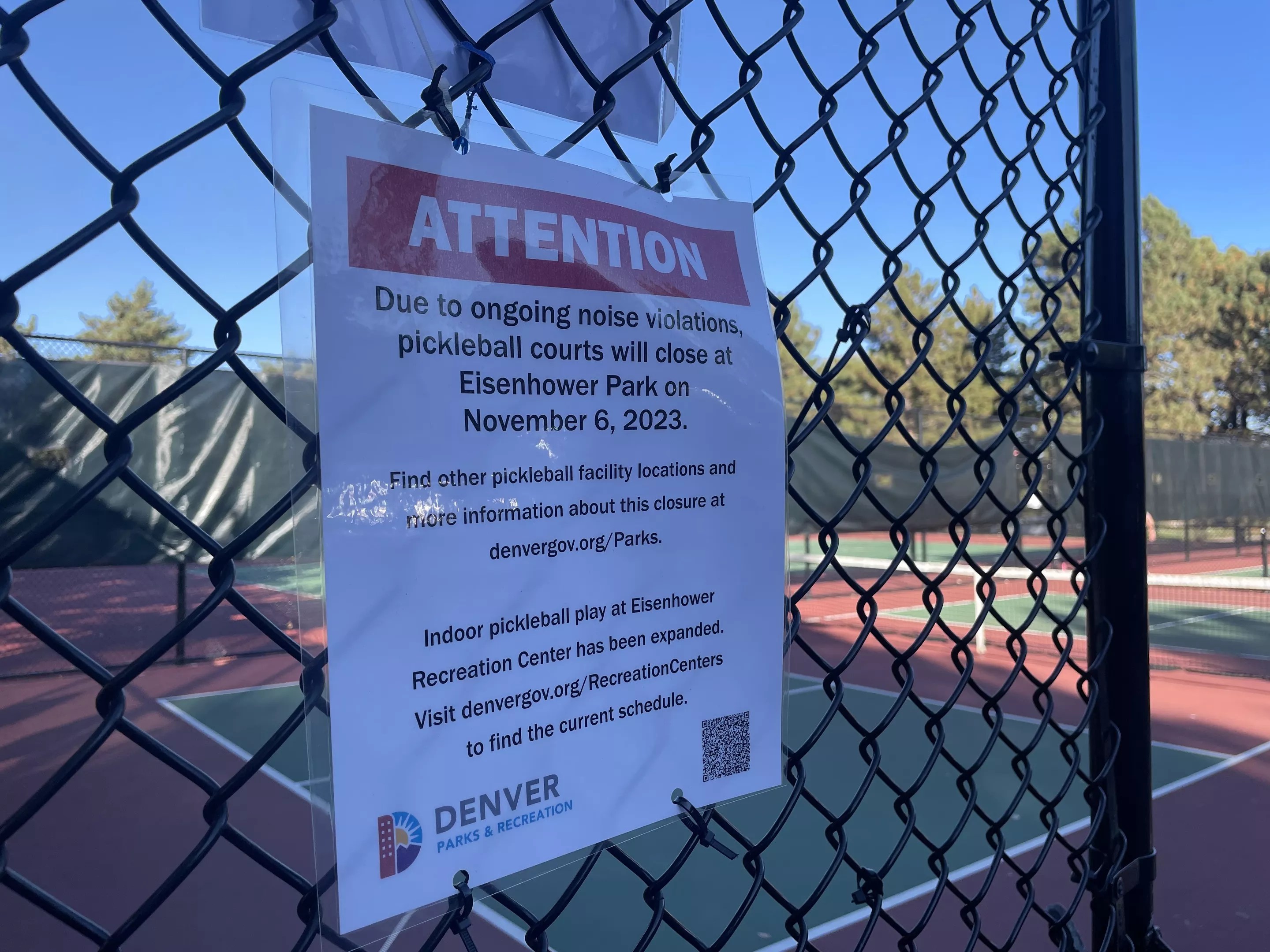
The Eisenhower Pickleball Courts closed in November of last year, but reopened in late 2024 thanks to special soft balls.
Catie Cheshire
Eisenhower Pickleball Courts Back Open…With Special Balls
If Denver isn’t short on anything, it’s self-entitlement and a hunger for pickleball courts. The two don’t play well together, either, which is why four pickleball courts were closed at Mamie D. Eisenhower Park in 2023 over noise complaints. The ordeal represented a common battle between pickleball players and nearby homeowners who dislike hearing that loud whack of a plastic pickleball hitting a paddle. Denver’s solution: making the balls softer.
Unveiled by Denver Parks & Recreation in November, the city’s hard-sought soft balls are made of foam instead of plastic, but allegedly bounce the same. Yes, it’s the squishy way or the highway with Parks & Rec, which has banned all plastic pickleballs from the Eisenhower courts. Angry Colorado natives and Facebook commenters, rejoice: You can now officially say Denver has gone soft.